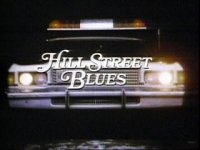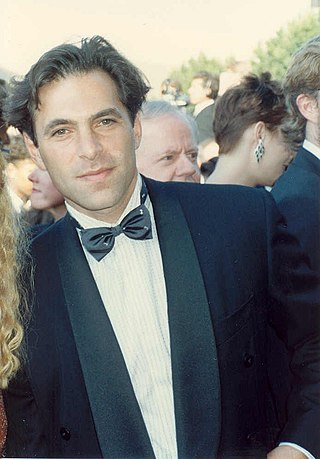
Steven Ronald Bochco was an American television writer and producer. He developed a number of television series, mostly crime dramas, including Hill Street Blues; L.A. Law; Doogie Howser, M.D.; Cop Rock; and NYPD Blue.

Hill Street Blues is an American serial police procedural television series that aired on NBC in prime-time from January 15, 1981, to May 12, 1987, for 146 episodes. The show chronicles the lives of the Metropolitan Police Department staff of a single police station located on Hill Street in an unnamed large U.S. city. The "blues" are the police officers in their blue uniforms.
Remington Steele is an American television series co-created by Robert Butler and Michael Gleason. The series, starring Stephanie Zimbalist and Pierce Brosnan, was produced by MTM Enterprises and first broadcast on NBC from October 1, 1982, to February 17, 1987. The series blended the genres of romantic comedy, drama, detective procedural and international political intrigue and espionage.

Kenneth Edward Olin is an American actor, television director, and producer. As an actor, Olin is known for his role as Michael Steadman in the ABC drama series Thirtysomething (1987–1991), for which he received a Golden Globe Award for Best Actor – Television Series Drama nomination in 1990. Olin later began working behind the scenes, as a director and producer. His credits as a producer include Alias (2001–2006), Brothers & Sisters (2006–2011), and This Is Us (2016–2022). Olin is married to actress Patricia Wettig.
Timothy Van Patten is an American director, actor, screenwriter, and producer. He has received numerous accolades including two Emmy Awards, a Peabody Award, and two Directors Guild of America Awards as well as nominations for two BAFTA Awards.

Stan Lathan is an American television and film director and television producer. He is executive producer and director of BET's Real Husbands of Hollywood. He has produced and directed numerous stand-up comedy specials starring comedian Dave Chappelle, including Killin' Them Softly, Equanimity, The Bird Revelation, Sticks & Stones, and The Closer.

MTM Enterprises was an American independent production company established in 1969 by Mary Tyler Moore and her then-husband Grant Tinker to produce The Mary Tyler Moore Show for CBS. The name for the production company was drawn from Mary Tyler Moore's initials.

Salli Richardson-Whitfield is an American actress and television director. Richardson is known for her role as Angela in the film A Low Down Dirty Shame (1994) and for her role as Dr. Allison Blake on the Syfy comedy-drama series Eureka (2006–2012).

Barbara Babcock is an American actress. She began her career on television in mid-1950s with guest-starring appearances in more than 60 television series through her career. She made several appearances on Star Trek: The Original Series, Mannix and Murder, She Wrote and had a recurring role in the CBS prime time soap opera, Dallas from 1978 to 1982.
Gregory Hoblit is an American film director, television director and television producer. He is known for directing the feature films Primal Fear (1996), Fallen (1998), Frequency (2000), Hart's War (2002), Fracture (2007), and Untraceable (2008). He has won nine Emmy Awards for directing and producing, an accolade which includes work on the television series Hill Street Blues, NYPD Blue, L.A. Law, and Hooperman, and the television film Roe vs. Wade.

The White Shadow is an American drama television series starring Ken Howard that ran on the CBS network from November 27, 1978, to March 16, 1981, about a white former professional basketball player who takes a job coaching basketball at an impoverished urban high school with a racially mixed basketball team. Although the lead actor Howard was white, the series broke new ground as the first television ensemble drama to feature a mostly African American cast, with African American actors playing the high school principal and vice-principal, the majority of the teenage basketball players, and other supporting roles. The White Shadow also dealt with controversial subject matter such as sexually transmitted disease and gay sexual orientation among high school students.
Robert Stanton Butler was an American film and Emmy Award-winning television director. He is best known for his work in television, where he directed the pilots for a number of series including Star Trek, Hogan's Heroes, Batman and Hill Street Blues.
The 37th NAACP Image Awards ceremony, presented by the National Association for the Advancement of Colored People (NAACP), honored the best in film, television, music of 2005 and took place on February 25, 2006, at the Shrine Auditorium. The show was televised live on Fox, March 3 at 8 p.m. EST and hosted by Cuba Gooding Jr.
Jeff Bleckner is an American theatre, television, and film director.
William M. Nicholson is a sound re-recording mixer at NBC Universal studios in Los Angeles, California. During his lengthy career, he has received numerous awards and nominations, including 5 Emmy awards, 22 Emmy nominations, 2 Cinema Audio Society nominations, and an Academy Award nomination for Martin Scorsese's 1980 film Raging Bull. He is also a member of the Academy of Motion Picture Arts and Sciences.
Joshua Brand is an American television writer, director, and producer who created St. Elsewhere, I'll Fly Away and Northern Exposure with his writing-and-producing partner John Falsey, with whom he worked through 1994. He was also a writer and consulting producer of FX's 2013–18 series The Americans.
Glenn Jordan is a retired American television director and producer.
Burton Field Brinckerhoff is an American actor, director, and producer. He was nominated for a Tony Award for his role as Igor in the play Cactus Flower (1965–1968), a Daytime Emmy Award for directing an episode of the television series The ABC Afternoon Playbreak (1973), and three Primetime Emmy Awards for directing episodes of the television series Lou Grant (1978–1982).
"Hill Street Station" is the first episode of the first season of the American serial police drama Hill Street Blues. "Hill Street Station" originally aired in the United States on NBC on Thursday January 15, 1981, at 10:00 pm Eastern Time as part of a two-week five-episode limited-run pilot airing on Thursdays and Saturdays. The episode won numerous Primetime Emmy Awards, a Directors Guild of America Award, a Writers Guild of America Award, and an Edgar Award as well as Emmy Award nominations for film editing, music composition, and art direction. The episode was directed by Robert Butler and written by Michael Kozoll and Steven Bochco.
Joey Aresco is an American film and television actor. He is known for playing the role of Sgt. John David Hutchinson in the first season of the American television series Baa Baa Black Sheep.







